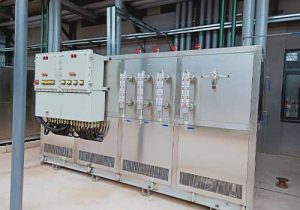thermic fluid heaters
Thermic fluid heaters, often referred to as thermal oil heaters, play a significant role in industrial heating processes. These heaters utilize a thermic fluid, typically a heat – transfer oil, as the medium to transfer heat.

Principle
The basic working principle of thermic fluid heaters is based on the circulation of the thermic fluid. The heater consists of a combustion chamber, a heat exchanger, and a circulation pump. Fuel, such as natural gas, oil, or coal, is burned in the combustion chamber to generate heat. This heat is then transferred to the thermic fluid in the heat exchanger. The heated thermic fluid is pumped through a closed – loop system to the points where heat is required. As the thermic fluid circulates, it gives off heat to the process equipment and then returns to the heater to be reheated. This continuous cycle ensures a stable supply of heat.
Applications
Thermic fluid heaters have a wide range of applications across multiple industries.
Chemical Industry: In chemical reactions, many processes require precise temperature control. Thermic fluid heaters can provide the necessary heat for processes like polymerization, distillation, and chemical synthesis. For example, in the production of plastics, the polymerization reaction needs to be carried out at a specific temperature range, and thermic fluid heaters can maintain this temperature accurately.
Food Industry: They are used in food processing operations such as baking, drying, and frying. In large – scale bakeries, thermic fluid – heated ovens can ensure even baking of bread and pastries, improving product quality.
Pharmaceutical Industry: In pharmaceutical manufacturing, maintaining the correct temperature is crucial for drug synthesis and drying processes. Thermic fluid heaters can offer a reliable heat source, ensuring the quality and safety of pharmaceutical products.

Advantages
High Efficiency: Compared to some traditional heating methods, thermic fluid heaters are highly efficient. The thermic fluid has a high heat – carrying capacity, which means it can transfer a large amount of heat with a relatively small flow rate. This results in less energy consumption for the same heating task.
Precise Temperature Control: They can achieve very accurate temperature control. The temperature of the thermic fluid can be precisely regulated, which is essential for many industrial processes that require a specific temperature range.
Safety: Since the thermic fluid operates in a closed – loop system, there is less risk of leakage and combustion compared to some direct – fired heating methods. Additionally, most thermic fluids have a high flash point and low volatility, reducing the fire and explosion hazards.
Maintenance
Regular maintenance is essential to ensure the proper operation of thermic fluid heaters. This includes checking the oil level and quality of the thermic fluid regularly. Over time, the thermic fluid may degrade due to heat and oxidation, so it needs to be replaced periodically. The combustion system should also be inspected regularly to ensure efficient fuel combustion and proper air – fuel ratio. Filters in the circulation system need to be cleaned or replaced to prevent blockages.

Future Development Trends
With the increasing emphasis on energy conservation and environmental protection, future thermic fluid heaters are likely to focus on improving energy efficiency and reducing emissions. New materials for thermic fluids may be developed to further enhance heat – transfer performance and stability. Additionally, more advanced control systems will be introduced to achieve more intelligent operation and better energy management.
In conclusion, thermic fluid heaters are indispensable in modern industrial heating. Their unique working principle, wide applications, numerous advantages, and the need for proper maintenance make them a key component in many industrial processes. Understanding these aspects is crucial for industries that rely on them for efficient and safe heat – supply operations.
Related recommendations
What Factors Affect the Price of Water-cooled Screw Chillers?
1335What Factors Affect the Price of Water-cooled Screw Chillers? Water-cooled screw chillers are refrigeration equipment that must be used in the production process of many enterprises. However,...
View detailstemporary chiller
440Understanding Temporary Chillers Temporary chillers are a type of portable cooling system that provides short-term or temporary cooling solutions for a variety of applications. Unlike permanent...
View detailsWhat is the reason for the overheating of compressors in water cooled industrial chiller?
971What is the reason for the overheating of compressors in water cooled industrial chiller? The compressor is overloaded and operates with overcurrent, which may be caused by: 1) T...
View detailsWhat is the cleaning method for the condenser of a 1 ton chiller?
1321What is the cleaning method for the condenser of a 1 ton chiller? The key to cleaning the condenser of industrial chillers is to pay attention to: the inlet and outlet water temperature...
View details
 LNEYA Chiller
LNEYA Chiller







HelloPlease log in